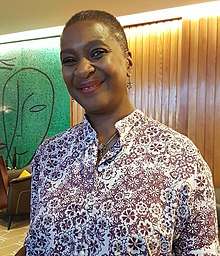Iyiola Solanke
Iyiola Solanke is an Academic Fellow in the Inner Temple and Chair in European Union law at the University of Leeds. She is interested in the European Union and racial integration, and founded the Black Female Professors Forum in 2017.
Iyiola Solanke | |
|---|---|
 at TEDxLondon Beyond Borders in May 2019 | |
| Academic background | |
| Alma mater | University of London London School of Economics |
| Academic work | |
| Institutions | University of Leeds University of Salamanca University of Michigan Law School |
Early life and education
Solanke earned a bachelor's degree in German and Drama at the University of London, and graduated in 1992. She moved to the London School of Economics for her graduate studies, earned a master's degree and PhD in 2005. She worked as a Teaching Fellow at the London School of Economics.[1] She joined the University of Michigan Law School as a Jean Monnet Fellow in 2007.[2][3]
Research and career
Solanke investigates governance in European institutions, including the European Court of Justice.[1] She specialises in discrimination law and European Union law.[4] Solanke joined the University of Leeds in 2010.[5] That year, Solanke was one of the first people to be appointed Academic Fellow of the Inner Temple. She founded Temple Women's Forum North in 2013.[6] The forum exists to extend outreach from the Inner Temple to legal professionals in the North East.[7] Solanke investigates discrimination law as a stigma using sociological and socio-psychological theories.[8] She is a Visiting Professor at Wake Forest University, where she teachers courses European Union law.[9] She has written about the need for proper rights of European Union nationals after the United Kingdom has left the European Union.[10]
Solanke was appointed to the University of Salamanca in 2017.[11] She was made a member of the Valuation Tribunal for England, which looks to support legal appeals for the population of the United Kingdom.[12] In January 2018 Solanke was appointed the Fernand Braudel Fellow at the European University Institute, where she is working on the theory and practise of judiciary diversity in Europe.[13]
Solanke was appointed chair of the inquiry into the history of eugenics at University College London.[12][14] The inquiry was launched in November 2018, and will inform the University College London strategy on teaching and studying eugenics, as well as identifying its relationships with modern-day racism.[12]
Advocacy and public engagement
Solanke founded the Black Female Professors Forum in 2017.[15] She has written for the Huffington Post and is a speaker at TEDxLondon in 2019.[16][17]
In January 2018, Solanke joined a commission investigating the death of Oury Jalloh.[18]
Books
References
- editor, European Institute web. "Dr Iyiola Solanke - Dr Iyiola Solanke - Visiting Staff - Who's Who - European Institute - Home". www.lse.ac.uk. Retrieved 2019-05-10.CS1 maint: extra text: authors list (link)
- "Editors". eutopialaw. 2011-09-09. Retrieved 2019-05-10.
- "Dr Iyiola Solanke" (PDF). London School of Economics. Retrieved 2019-05-11.
- "Professor Iyiola Solanke - A public health narrative for anti-discrimination law". Keele University. 2018-11-28. Retrieved 2019-05-10.
- "Iyiola Solanke – Black Female Professors Forum". Retrieved 2019-05-10.
- "| Temple Women's Forum". Inner Temple. Retrieved 2019-05-10.
- "Iyiola Solanke Eng". The International Independent Commission on the Death of Oury Jalloh. Retrieved 2019-05-10.
- "A Theory of Anti-discrimination Law". www.bloomsburyprofessional.com. Retrieved 2019-05-10.
- "Visiting Professor Iyiola Solanke returns to teach European Union Law course | News & Events | Wake Forest School of Law". news.law.wfu.edu. Retrieved 2019-05-10.
- "On the Frontline: Residency Rights and Non-EU Parents of British Citizens". Discover Society. 2017-06-06. Retrieved 2019-05-10.
- "Meet Iyiola Solanke: our new faculty member". Global and International Studies. 2017-10-30. Retrieved 2019-05-10.
- UCL (2018-12-05). "Inquiry launches into history of eugenics at UCL". UCL News. Retrieved 2019-05-10.
- "Iyiola Solanke". European University Institute. Retrieved 2019-05-10.
- Fazackerley, Anna (2018-12-06). "UCL launches inquiry into historical links with eugenics". The Guardian. ISSN 0261-3077. Retrieved 2019-05-10.
- Mohdin, Aamna; Mohdin, Aamna. ""Political blackness": a very British concept with a complex history". Quartz. Retrieved 2019-05-10.
- "Iyiola Solanke | HuffPost". www.huffpost.com. Retrieved 2019-05-10.
- "Professor Iyiola Solanke". TEDxLondon. Retrieved 2019-05-10.
- Maxwill, Peter (2018-10-23). "Oury Jalloh: In Arrest verbrannt - warum sich der Fall hinzieht". Spiegel Online (in German). Retrieved 2019-08-24.
- Reviews of Making Anti-Racial Discrimination Law:
- Marzo, Claire (14 July 2011). European Law Journal. 17 (4): 558–560. doi:10.1111/j.1468-0386.2011.00565_4.x.CS1 maint: untitled periodical (link)
- Hermanin, Costanza (October 2010). Ethnic and Racial Studies. 33 (9): 1679–1680. doi:10.1080/01419870.2010.510902.CS1 maint: untitled periodical (link)
- Reviews of Discrimination as Stigma:
- Quinn, Paul (4 September 2017). International Journal of Discrimination and the Law. 17 (3): 213–216. doi:10.1177/1358229117728621.CS1 maint: untitled periodical (link)
- Linton, William (6 July 2018). Industrial Law Journal. 47 (3): 458–463. doi:10.1093/indlaw/dwy016.CS1 maint: untitled periodical (link)
- Xenidis, Raphaële (2018). "Book Review". European Journal of Legal Studies. 10 (2): 231–248.
- Eidelson, Benjamin (April 2018). Ethics. 128 (3): 678–682. doi:10.1086/695999.CS1 maint: untitled periodical (link)
External links
- "Professor Iyiola Solanke". University of Leeds: School of Law.